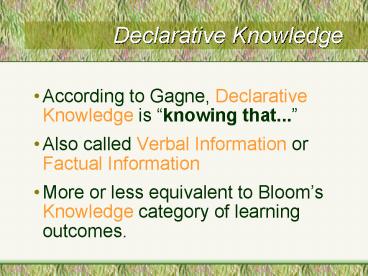Declarative Knowledge PowerPoint PPT Presentation
1 / 19
Title: Declarative Knowledge
1
Declarative Knowledge
- According to Gagne, Declarative Knowledge is
knowing that... - Also called Verbal Information or Factual
Information - More or less equivalent to Blooms Knowledge
category of learning outcomes.
2
Declarative Knowledge
- Learning OutcomesRecall or recognise
- labels or names
- facts
- lists
- images
- sequences
- events
- etc.
3
Declarative Knowledge
- According to Bloom, the learning of knowledge
level outcomes is prerequsite to learning
comprehension, application, or higher outcomes. - But Gagné says factual information is a
fundamentally different type of learning (not
lower), and does not have to precede other types
of learning. - What do you think?
4
Declarative Knowledge
- General strategy declarative knowledge needs to
be organised into meaningful and memorable ways. - Should the instruction do the organising? Or
should the learner find their own organisation
scheme?
5
Chunking Strategy
- Chunks of about 3 to 7 items can be kept in
short-term memory. - Break down the information into manageable
chunks. - Use presentation, practice, and feedback for one
chunk till learners can master it. - Review prior chunks when a new chunk is mastered.
6
Mnemonic Strategy
- Acronyms
- Example KISS
- Keep It Simple, Stupid
- Rhymes and songs
- Example The ABC song
7
Programmed Learning
- Based on behaviouristic principles
- Stimulus-Response-Reinforcement
- Practice over and over and over and over and
- It works well, but it is tremendously boring.
8
Context-Dependent Memory
- Things are remembered and recalled more easily if
the context for learning matches the context for
recalling. - This has been verified for many types of contexts
and situations. - What are the implications of this for preparing
for a memorisation test?
9
Decreasing Memory Load
- Why should we have to always remember things?
- Perhaps there are alternatives we can use to help
people to access raw information instead of
simple memorisation. - Can you think of some alternatives?
10
Concept Learning
- A concept is a set of specific objects, symbols,
or events which are grouped together on the basis
of shared characteristics and which can be
referenced by a particular name or symbol. - (Merrill Tennyson, 1977)
11
Concept Learning
- Learning outcomes
- discriminate
- classify
- sort
- define
- describe attributes
12
Concept Learning
- Concepts are categories of similar ideas, events,
objects, people, etc. - Concepts are abstractions.
- Concepts are ways to organise information.
- We continually form concepts from the moment we
are born.
13
Concept Learning
- Naturally, we look for patterns which help us to
distinguish between things of one category and
things not in that category. - Mostly we use an inductive approach.
- We look at features (attributes) and sort things
according to similarities and differences. From
that process, concepts are born.
14
Concept Teaching
- Not quite the same at natural concept formation.
- General strategies
- expository approach
- inquiry approach
- Some common elements which can be re-arranged to
make instruction
15
(No Transcript)
16
Expository Strategy
- Present name of concept and definition
- General category description
- Defining attributes
- Show prototype example
- Isolate (highlight) attributes
- Present other examples and compare with
non-examples - Learners practice classifying cases as belonging
or not belonging
17
Inquiry Strategy
- Present a number of labeled examples and
non-examples - Ask students to try to formulate hypotheses about
different categories and their key attributes - Teacher confirms the hypotheses, restates
definition - Learners generate their own examples and
non-examples
18
Concepts in the workplace
- Many concepts relate to people being able to
distinguish or define highly subjective or
qualitiative attributes - Things that are Good, Correct, Effective, Proper,
Acceptable - vs non-examples of Bad, Incorrect, Ineffective,
Improper, Defective
19
Question...
- What is the difference between a concept and fact?

